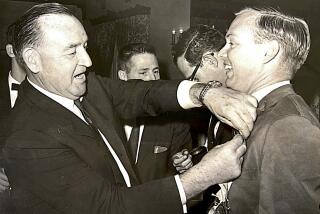After the Air Kisses, a Knife in the Back
As far back as the Gold Rush, the sunny surface of California life has hidden a mean, score-settling strain that is clearly evident in the recall election.
“Don’t get mad, get even” is a hallowed adage in California politics. Gray Davis destroyed Richard Riordan in 2002. Scarcely had the governor cleaned the blood from his hands when his foes settled the score with the recall. And as Davis struggled to revive his barely breathing career, someone else claimed vengeance: Lt. Gov. Cruz Bustamante. Bustamante entered the race in part as payback for the governor’s allowing an appeal to go forward that tried to keep alive Proposition 187, the measure aimed at limiting illegal immigrants’ access to public services.
Political score-settling, of course, is not unique to California. But outside observers searching for convenient cliches often overlook this in a culture they see as best represented by air kisses and Hollywood embraces. They don’t know that the embracer may also be hiding a knife to use on the unsuspecting and that a smiling demeanor may mask an angry soul.
One of the first, and still most perceptive, observers of this two-faced conduct was the distinguished philosopher Josiah Royce, whose book “California: A Study of the American Character” was published in 1886. Royce grew up in the Mother Lode mining town of Grass Valley, a child of pioneer parents; he wrote the book while a young instructor at Harvard, just beginning a career that brought him international acclaim.
The pioneers, he wrote, had a “remarkable power of organizing quickly for the purpose of either defending the established authorities, if these should meet their approval, or of setting the authorities aside, if these should seem to them dangerously inefficient.”
Authorities and the law were shoved aside, for example, when American settlers squatted on the large land grants given to the colonial Californians by the governments of Spain and Mexico, which led to what Royce called “the unfortunate concentration of land in a few hands,” a process that continues to shape California from the suburbs to the Central Valley.
San Francisco’s infamous Vigilance Committees, formed by civic leaders to wipe out violent crime and corruption in the 1850s, cloaked themselves in sanctimonious rhetoric while they ignored the courts and the rest of government, hunting down those suspected of offenses ranging from murder to ballot-box stuffing. Targets were picked in secret, sometimes just to settle old scores.
Twenty years later, ex-vigilante Dennis Kearney brought more frontier frustrations into the open with the Workingman’s Party and its admirable program of an eight-hour day, compulsory education, fair taxes and state regulation of banks, industry and railroads. But Kearney is most remembered for his movement’s dark side, as exemplified by its slogan: “The Chinese Must Go.”
The same duality -- high-minded goals and vicious behavior -- was later exhibited by the Progressives, who, under the leadership of Gov. Hiram Johnson, initiated many reforms, including workers’ compensation, limits on child labor and today’s instruments of political revenge, the initiative, referendum and the recall. But just as striking a legacy were the Johnsonites’ anti-Asian legislation and agitation, which culminated in the internment of Japanese Americans at the beginning of World War II. “By and large, the reform leaders of the Johnson era were racists, including Johnson himself,” wrote historian Carey McWilliams in his book “California: the Great Exception.”
Immigrants -- and migrants for that matter -- have played their own role in the state’s sunshine-and-noir character. Newcomers arrive at the edge of the continent with high hopes, but many of them have been inevitably disappointed in the harsh reality of making it in California. As well, disappointment creates a susceptibility to prospective hucksters and messiahs, also usually newcomers to the scene and another California cultural and political specialty.
“The good fellow is easily adored in a new city -- all the more because one has had no means to judge of his weaknesses by means of a lifelong acquaintance,” Royce said.
The politics born out of California’s mixture of good intentions and embittered anger often leave in their wake complications and damage undreamed of by its authors. Proposition 13 is one example. Term limits is another. Add to them the recall. In the early 20th century, it stemmed from well-deserved disgust with state and local government. The current recall invokes the high principles of citizen democracy. But it threatens to unleash an anger at all institutions, good and bad, based on a know-nothing feeling that “they’re all bums, throw them out.”
But, in the fast turnaround of California politics, even a propensity for revenge can reveal a bright side. Royce, while exposing the mean streak of the frontier, always looked for a more hopeful future, even in the worst excesses of the vigilantes. “While they boasted of their prowess and denied their sins,” he wrote, “they would quietly go on to correct their past grievous errors, good humored and self confident as ever.”
In the throes of the 2003 recall, let’s hope the old philosopher’s optimism holds true.
More to Read
Get the L.A. Times Politics newsletter
Deeply reported insights into legislation, politics and policy from Sacramento, Washington and beyond. In your inbox three times per week.
You may occasionally receive promotional content from the Los Angeles Times.










